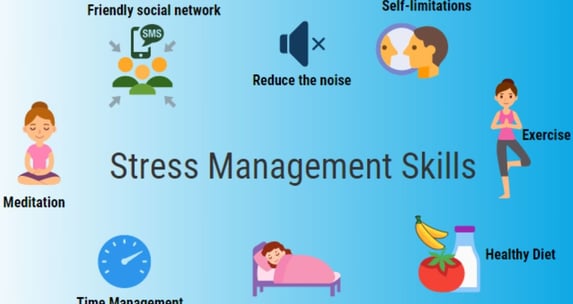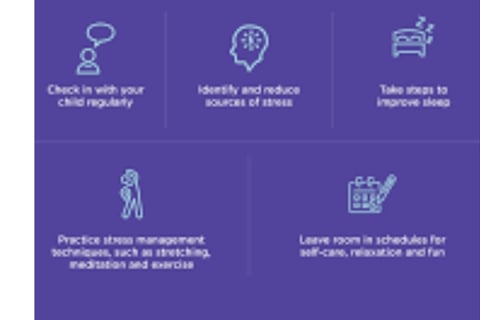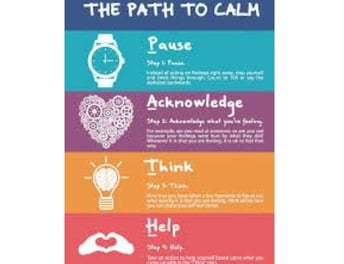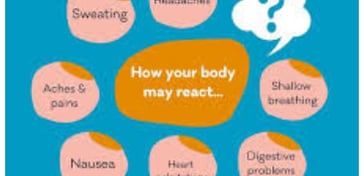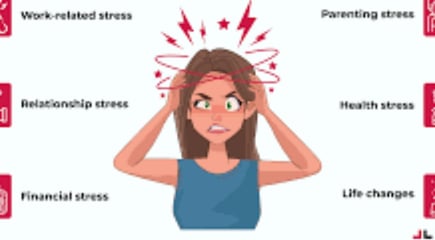
Health is a crown on the heads of the healthy that only the sick can see.

Praying , Fasting and Quran : Mental Health and Stress
🧠 Praying, Fasting & Quran: Natural Tools for Stress & Mental Health Discover how praying, fasting, and reciting the Quran can support mental health, reduce anxiety, and bring inner peace. A holistic approach rooted in faith and spiritual discipline.
NEUROPSYCHIATRY
Dr Hassan Al Warraqi
5/15/2024
Prayer, Fasting, and Quran : Mental Health and Stress
a state of worry or mental tension caused by a difficult situation
Everyone experiences stress to some degree
Stress affects both the mind and the body. Too much stress can cause physical and mental health problems
Stress, while a natural response to new, challenging, or threatening situations, can have significant effects on both physical and mental health
Stress itself is not inherently harmful; it becomes problematic when it persists and remains unmanaged
Stress is unlikely to directly cause death for most people
Chronic stress can lead to various health issues, including anxiety, depression, heart disease, and even early death
Short-term stress affects different bodily systems, such as the musculoskeletal, respiratory, cardiovascular, endocrine, gastrointestinal, and nervous systems.
These responses are designed to peak and then resolve
Diseases associated with chronic stress include anxiety, depression, pain, and fatigue
Impact on Heart Health:
Stress is directly associated with “silent killer.”
that both physical and mental stressors can contribute to sudden cardiac death (SCD)
While stress itself is unlikely to be fatal for most people
including cardiovascular issues. In some cases, stress may trigger a heart attack or exacerbate existing heart conditions
To mitigate the negative effects of stress
Regular Physical Activity: Engage in exercise on most days of the week.
Relaxation Techniques: Practice deep breathing, meditation, yoga, tai chi, or massage.
Maintain Social Connections: Spend time with family and friends.
Find Hobbies: Set aside time for activities you enjoy, such as reading, listening to music, or going for walks
Chronic Stress and Health Risks:
which persists over an extended period, can negatively impact various bodily systems
conditions such as high blood pressure, heart disease, weakened immune function, and gastrointestinal problems
Cardiovascular Health:
Stress activates the body’s “fight-or-flight” response, releasing stress hormones like cortisol and adrenaline
While this response is essential for survival, chronic activation can harm the cardiovascular system
Stress contributes to inflammation, arterial damage, and increased heart rate
Over time, this can lead to atherosclerosis (narrowing of arteries) and increase the risk of heart attacks and strokes
Sudden Cardiac Death (SCD):
SCD occurs when the heart suddenly stops functioning due to an electrical disturbance. Stress, both physical and emotional, can trigger SCD
stressors (such as anger, anxiety, and grief) were associated with an increased risk of SCD
stress management :
Physical Activity: Regular exercise helps reduce stress hormones and promotes relaxation.
Regular exercise releases endorphins, which are natural mood boosters
Aim for at least 30 minutes of moderate-intensity exercise most days of the week
Activities like walking, jogging, swimming, or dancing can help alleviate stress
Mindfulness and Relaxation Techniques: meditation, deep breathing, and yoga can alleviate stress.
Social Support: Connecting with loved ones provides emotional support.
Healthy Lifestyle Choices: Proper nutrition, adequate sleep, and avoiding excessive alcohol and tobacco contribute to stress reduction
Healthy stress helps us adapt and thrive, while unhealthy stress refers to unmanaged stress that harms our well-being
Deep Breathing and Mindfulness:
Practice deep breathing exercises to calm your mind. Focus on your breath, inhaling deeply through your nose and exhaling slowly through your mouth
Mindfulness meditation helps reduce stress by promoting awareness of the present moment. Find a quiet space, sit comfortably, and focus on your breath or a specific sensation
Progressive Muscle Relaxation:Tense and then relax each muscle group in your body
Start from your toes and work your way up to your head
This helps release physical tension and promotes relaxation
Social Connections:Spend time with family and friends. Social support is crucial for managing stress.
Share your feelings and concerns with someone you trust
Healthy Lifestyle Choices:
Prioritize sleep
Lack of sleep exacerbates stress
Eat a balanced diet rich in fruits, vegetables, whole grains, and lean proteins
Limit caffeine and alcohol intake
Creative Outlets:Engage in activities you enjoy, such as painting, writing, playing a musical instrument, or gardening
Time Management:Break tasks into smaller, manageable steps. Prioritize and tackle them one at a time.
Learn to say no when necessary to avoid overcommitting
Humor and Laughter:Watch a funny movie, read a humorous book, or spend time with people who make you laugh
Laughter reduces stress hormones and promotes relaxation
relation between stress and overthinking
Overthinking is a common habit that can significantly impact our mental and physical health
Negative Focus and Ruminating:
Overthinking often involves dwelling on negative thoughts, rehashing past experiences, or worrying excessively about the future.
When we ruminate on certain thoughts, they can snowball into more extreme negative thinking patterns
Impact on Daily Life:
Overthinking becomes problematic when it starts to affect our everyday functioning.
Sleep Disturbances: If you struggle to turn off these thoughts at night, it can impair your sleep.
Substance abuse: Using drugs or alcohol or smoking to cope with stress can be dangerous
Appetite Changes: Overthinking may affect your eating habits.
Social Isolation: Being lost in your thoughts can lead to isolation from others.
Self-Protection Mechanism:
Some people use overthinking as a misguided form of self-protection
assuming everyone is untrustworthy to avoid getting close to anyone
Overthinking can manifest physically:
Headaches
Body Aches
Stomach Problems
Associated Mental Health Conditions:
Depression
Anxiety
Post-Traumatic Stress
Borderline Personality Disorder
Breaking the Cycle:
Identify triggers for overthinking (past trauma or current stressors).
Journaling: Express and process thoughts.
Mindfulness Activities: Stay present and avoid dwelling on the past or future
Substance Misuse: Using drugs or alcohol to cope with stress can be dangerous and even fatal
prayer fasting & reading holly quran sterss managment
how prayer, fasting, and reading the Holy Quran can contribute to stress management:
Prayer (Salat):
Regular salat (prayer) provides a sense of peace and connection with Allah
During prayer, focus on the present moment, seeking refuge from stress
The physical movements and recitations of holy quran during prayer help calm the mind
fasting:
Abstaining from food and drink encourages mindfulness
Reflect on gratitude and patience during fasting
Fasting teaches self-discipline and empathy with those have no food
Reading the Holy Quran:
Daily Quran recitation brings tranquility
Reflect on verses that address stress, patience, and trust in Allah
Seek solace and guidance from the Divine words
Remember, these practices not only strengthen your faith but also provide practical tools for managing stress
keywords
Mental health , stress , prayer, fasting, reading the Holy Quran , body ,Cardiovascular Health , stress management ,Overthinking , substance abuse , depression , anxiety , sleep disturbance ,
The Islamic Approach to Mental Health
A Balanced Model of Healing:
Islam emphasizes harmony between spiritual and physical well-being, guided by Quranic principles like: “Seek the Hereafter through what Allah has given you, but do not neglect your share of this world” (Quran 28:77).
Sharia provides ethical guidelines that nurture adaptive coping strategies for life’s stressors.
Acts of Worship as Stress Relievers:
Prayer (Salah): Cultivates inner peace through mindfulness and rhythmic physical movements.
Fasting (Sawm): Enhances self-discipline, gratitude, and reduces symptoms of anxiety.
Quranic Recitation: Daily reflection on verses promotes optimism and emotional balance.
Integrating Islamic Values into
Psychotherapy:
Challenges in Western Therapy:
Lack of awareness about Islamic teachings among practitioners can alienate Muslim patients.
Adapting evidence-based therapies to include Islamic concepts, such as:
Using Prophetic narratives to reframe negative thoughts.
Incorporating Quranic metaphors into cognitive-behavioral techniques.
Effective Islamic Counseling Models:
Religious Guidance: Collaboration with imams to address marital or social conflicts.
Music and Meditation Therapy: Utilizing devotional chants (Nasheeds) and aromatherapy with halal-approved scents.
Islamic Perspectives on Mental Disorders:
Depression and Anxiety:
Encouraging optimism through verses like “With hardship comes ease” (Quran 94:5-6).
Reinforcing Tawakkul (trust in God) to alleviate worry.
Obsessive-Compulsive Disorder (OCD):
Reframing intrusive thoughts as “Waswas” (whispers from Satan) and seeking refuge in God.
Citing the Hadith: “Allah forgives my Ummah for what their souls whisper to them.”
Addiction:
Islam’s prohibition of alcohol/drugs reduces substance abuse rates in Muslim societies.
Alternative therapies like aromatherapy (oud, incense) align with Islamic ethics.
The Mental Health Benefits of Fasting:
Studies show a 40% improvement in psychological symptoms during Ramadan.
Fasting fosters empathy and self-control by avoiding gossip and negative behaviors.
Guidelines for Mental Health Professionals:
Cultural Sensitivity:
Adjust medication schedules around fasting hours.
Avoid non-halal ingredients in pharmaceuticals.
Collaboration with Religious Leaders:
Integrate faith-based advice into treatment plans.
Conclusion:
Islam provides actionable strategies for mental wellness through daily practices like prayer and fasting.
Tailoring psychotherapy to respect Islamic values ensures effective care for Muslim patients.
Professionals must adopt culturally sensitive approaches to bridge faith and mental health support.
Keywords
Islamic mental health, Quranic therapy, Ramadan fasting benefits, prayer and stress relief, Muslim psychotherapy.
Hashtags
#MentalHealthInIslam #QuranicHealing #RamadanWellness #TrustInAllah #FaithAndTherapy
Frequently Asked Questions About Islam and Mental Health FAQS
1. How Does Islam View Mental Health and Psychotherapy?
Mental Health in Islamic Teachings:
Mental well-being is integral to overall health, emphasized as a divine trust (Amanah) to be safeguarded.
Islam encourages seeking professional psychological help, aligning with the Quranic principle of preserving life and health.
A Legacy of Early Contributions:
Muslim scholars like Avicenna (Ibn Sina) and Al-Razi pioneered mental health care, establishing the first psychiatric wards in Baghdad and Cairo.
2. How Do Islamic Values Positively Impact Mental Health?
Ethical Framework for Resilience:
Concepts like Tawakkul (trust in God), Sabr (patience), and hope in divine mercy foster psychological resilience.
Daily acts of worship (prayer, fasting, remembrance of God) promote inner peace and reduce stress.
Scientific Validation:
Studies show religiously observant Muslims report 30% lower rates of depression compared to non-observant individuals.
3. How Can Islamic Principles Be Integrated into Modern Psychotherapy?
Practical Integration Strategies:
Use Quranic stories (e.g., Prophet Job’s perseverance) and Prophetic traditions to reframe negative thoughts.
Adapt cognitive-behavioral therapy (CBT) techniques to align with Islamic concepts like gratitude (Shukr) and reflection (Tafakkur).
Cultural Competence Matters:
Therapists familiar with Islamic values build stronger trust and improve treatment outcomes for Muslim patients.
4. What Is Islam’s Perspective on Depression, Anxiety, and Suicide?
Depression and Anxiety:
Viewed as tests of faith; Islam encourages coping through prayer, reliance on God, and professional care.
Quranic verses like “And whoever relies on Allah—He will suffice them” (Quran 65:3) offer solace.
Suicide:
Strictly forbidden, but Islam acknowledges mental health struggles. Prevention focuses on banning intoxicants and strengthening community support.
5. How Do Prayer, Fasting, and Quran Recitation Improve Mental Health?
Prayer (Salah): A Natural Stress Reliever:
Rhythmic movements and mindfulness in prayer trigger relaxation responses.
Fasting (Sawm): A Lesson in Self-Control:
70% of fasting Muslims report improved mood during Ramadan, linked to gratitude and discipline.
Quranic Recitation: A Source of Calm:
Verses emphasizing divine mercy (e.g., Ayat al-Kursi) reduce anxiety and instill hope.
6. How Can Islamic Concepts Correct Negative Thought Patterns?
Reframing Cognitive Distortions:
Replace “I’m a failure” with “This is a test from Allah, and I will overcome it with His help.”
Hadiths like “Do not say ‘By Allah’s will and my will’” reinforce optimism.
Addressing OCD (Waswas):
Intrusive thoughts are attributed to Shaytan (Satan); seeking refuge in God and therapy are combined solutions.
7. What Is Islam’s Stance on Complementary Therapies Like Music and Aromatherapy?
Music Therapy:
Permissible for therapeutic purposes if lyrics align with Islamic ethics. Historically used by scholars like Al-Farabi.
Meditation and Aromatherapy:
Reflecting on creation (Tafakkur) is a form of worship. Scents like oud and frankincense, rooted in Prophetic medicine, aid relaxation.
8. How Does Islam Promote Mental Wellness Through Family and Community?
Family: The First Line of Support:
Islam prioritizes strong family bonds, conflict resolution through compassion, and open dialogue.
Community: A Safety Net:
Social solidarity (e.g., charity/Zakat) reduces isolation and fosters belonging.
Advice for Professionals:
Address cultural factors like stigma (‘Ayb) when designing mental health programs for Muslim communities.
Keywords:
Islamic mental health, Quranic therapy, Ramadan fasting benefits, Tawakkul in psychology, Muslim family support.
Hashtags:
#IslamAndMentalHealth #QuranicHealing #RamadanWellness #TrustInAllah #MuslimFamily















